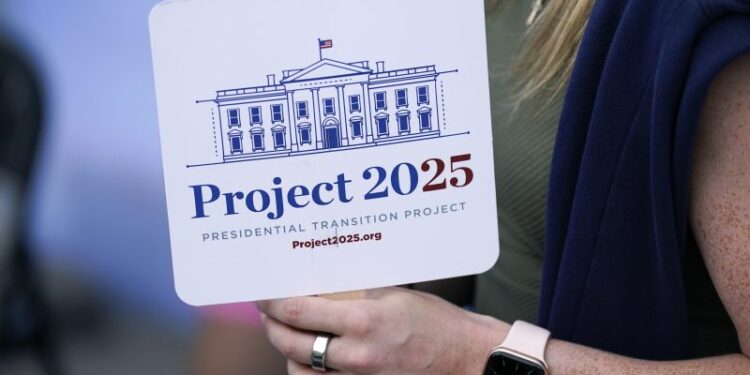
(NEXSTAR) — Throughout the current election season, Democrats and those trying to prevent a second term for Donald Trump have tried to tie the former president to Project 2025, the controversial plan for a future Republican president put together by the conservative Heritage Foundation think tank.
Trump has said he was unaware of the policy wishlist, and more recently, disavowed the plan, despite his close ties to many of its key architects. That hasn’t stopped Democrats from warning voters about Project 2025, even turning to comedian and “SNL” alum Kenan Thompson to highlight aspects of it during last month’s national convention.
Policy and staffing proposals from think tanks aren’t new. They’re common “across the ideological spectrum,” Bill Muck, a professor of political science at North Central College in Naperville, Illinois, told Nexstar. The hope for those crafting these proposals is that they will “influence the political process.”
Yet Project 2025 has remained a prevalent talking point for both parties recently. But what makes it so unique?
According to Muck, it comes down to the scope and specificity of the plan. The document, which is nearly 1,000 pages long, “goes into a lot of detail,” but seemingly serves to represent “a good chunk of where the conservative ideological movement is today,” he explained.
That, mixed with Trump not being “a policy guy,” gives space for groups like the Heritage Foundation to create detailed plans like Project 2025, according to Muck.
“Oftentimes, we point the finger at Donald Trump and say he’s the one driving this. Certainly, he plays a role in all of this, but this is a reflection of the broader movement, the base right now, so that’s where these ideas are turning up from.”
Because Project 2025 seemingly reflects a larger part of the party’s base, Muck noted that, unlike other similar policy wishlists, it could be more influential should Trump be elected president.
“Even though Donald Trump is, as he’s running, is running away from Project 2025 a little bit because it may not be politically advantageous, I think at a deeper level, there’s an agreement that this is where the conservative movement is,” Muck said. “It’s likely that if he is in office, he may not enact all of Project 2025, but it will likely be a blueprint for some of the core principles he would pursue as president.”
Among the proposals outlined in Project 2025, Muck said he believes Trump may be most interested in the unitary executive theory, or “the idea that the president has a tremendous amount of power.”
While the plan doesn’t outright point to that theory, it does outline a dramatic expansion of presidential power and a plan to fire as many as 50,000 government workers to replace them with presidential loyalists. It calls for the U.S. Education Department to be shuttered, and the Homeland Security Department dismantled, with its various parts absorbed by other federal offices.
“I think this is something that is going to be very, very appealing to Donald Trump, separate from all of the specifics, because as a president, Donald Trump sort of likes the idea of having power and being able to make those decisions.”
While distancing himself from Project 2025, Trump has already vowed his own overhaul of federal bureaucracy, which he has long blamed for blocking his first term agenda, saying: “I will totally obliterate the deep state.” The former president plans to reissue the Schedule F order stripping civil service protections. He said he’ll then move to fire “rogue bureaucrats,” including those who ”weaponized our justice system,” and the “warmongers and America-Last globalists in the Deep State, the Pentagon, the State Department, and the national security industrial complex.” Trump has also pledged to terminate the Education Department and wants to curtail the independence of regulatory agencies like the Federal Communications Commission. As part of his effort to cut government waste and red tape, he has also pledged to eliminate at least 10 federal regulations for every new one imposed.
The decision to make Ohio Sen. JD Vance his running mate was taken by some as one more connection to Project 2025. Heritage’s President Kevin Roberts has said he’s good friends with Vance and that the Heritage Foundation had been privately rooting for him to be the VP pick.
Vance penned the foreword to Roberts’ own new book, which was set to be out in September but has now been postponed as Project 2025 hits turmoil. Roberts is holding off the release of his potentially fiery new book until after the November presidential election.
The Associated Press contributed to this report.






